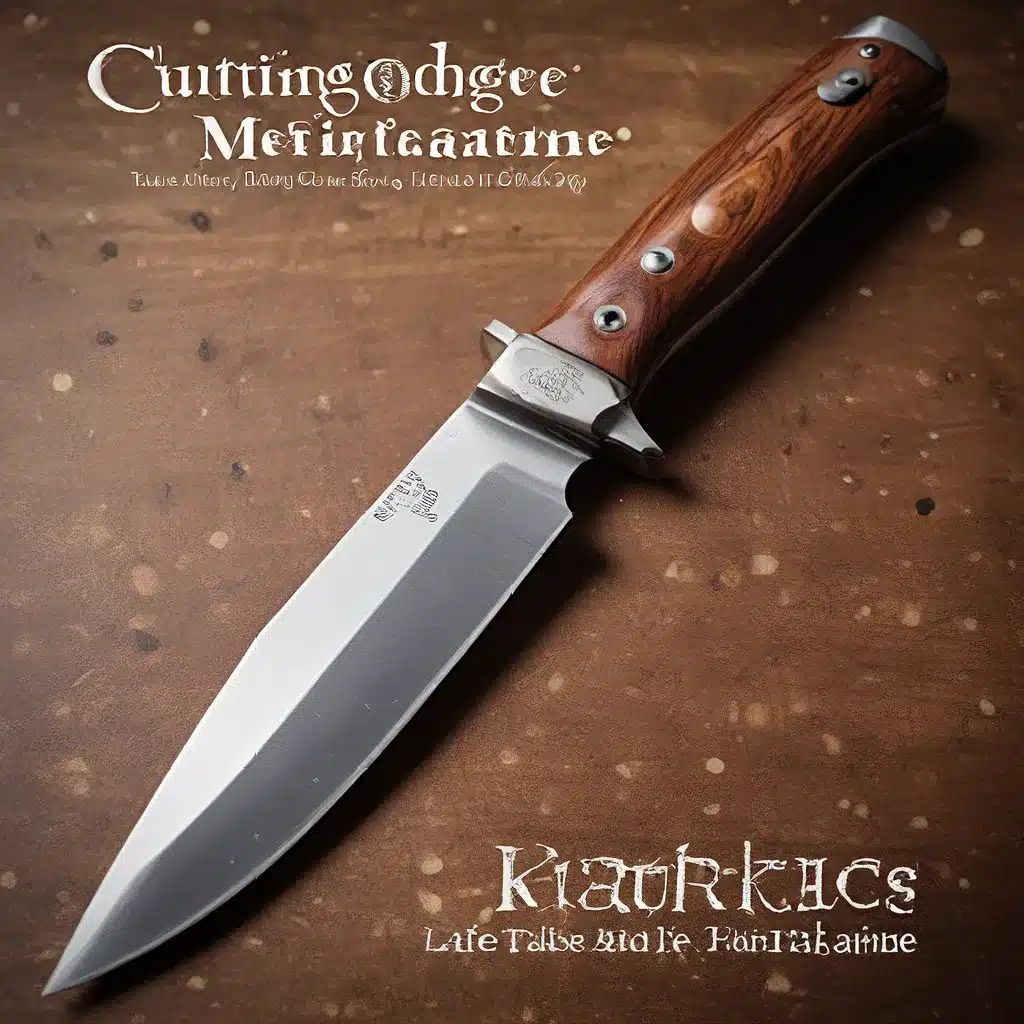
The Importance of Proper Knife Care
As a passionate home chef and avid collector of fine cutlery, I’ve learned that maintaining the integrity of my knives is just as crucial as wielding them with skill. These trusty tools are the backbone of any well-equipped kitchen, transforming everyday ingredients into culinary masterpieces. But like any valuable asset, they require attentive care and upkeep to ensure peak performance.
Herman Knives has long been a go-to destination for discerning home cooks and professional chefs alike, offering a curated selection of high-quality blades that are built to last. But even the most superior knives will quickly lose their edge without proper maintenance. That’s why I’ve dedicated countless hours to understanding the intricacies of knife care, from the best sharpening techniques to the optimal storage methods.
Sharpening Secrets
One of the most fundamental aspects of knife maintenance is regular sharpening. A dull blade not only makes meal prep a frustrating chore, but it can also be downright dangerous. That’s why I make it a habit to hone my knives on a consistent basis, using a variety of sharpening tools and methods.
The whetstone is a classic sharpening staple, allowing me to methodically restore the edge of my blades. I’ve mastered the art of finding the perfect angle and applying even pressure as I draw the knife across the stone. It’s a meditative process that gives me a sense of control and accomplishment.
For a quicker touch-up between full sharpenings, I rely on my electric knife sharpener. These compact devices make it easy to quickly refresh the edge, saving me time and effort. Of course, I always exercise caution, following the manufacturer’s instructions to the letter. After all, the last thing I want is to accidentally damage my beloved knives.
Knife expert Josh Donald advises against putting any knives in the dishwasher, as the harsh environment can dull the blades and damage the handles. Instead, he recommends handwashing with mild soap and warm water, then carefully drying them to prevent rusting.
Cutting Board Conundrums
Another vital aspect of knife care is being mindful of the surfaces I use for cutting. As Josh Donald wisely points out, abrasive surfaces like glass, marble, or ceramic can quickly dull even the sharpest of blades. That’s why I always reach for my trusty wooden cutting boards, which are gentle on my knives while providing a stable platform for chopping, slicing, and dicing.
But even wooden boards require special attention. I make sure to keep them clean and well-oiled, using a food-grade mineral oil to preserve the surface and prevent cracking or warping. And when it comes to prepping different ingredients, I maintain separate boards for meats, produce, and other tasks to avoid cross-contamination.
Proper Storage Techniques
Once my knives have been cleaned, sharpened, and used, the final step in their care routine is storage. I’ve learned the hard way that simply tossing them in a drawer can lead to all sorts of problems, from nicked edges to potential injury.
Instead, I employ a variety of storage solutions, from magnetic knife strips to custom-fitted blade guards. These methods not only protect the cutting edges but also keep my knives organized and easily accessible. Gordon Edgar, a seasoned cheesemonger and author, emphasizes the importance of storing knives in a way that prevents them from coming into contact with other objects, which can dull the blades over time.
Embracing the Artistry
Maintaining a well-curated collection of knives is an art form in itself, and I take great pride in the care and attention I lavish on my trusty tools. Each blade has a unique personality, from the sleek, razor-sharp slicers perfect for filleting fish to the rugged, versatile chef’s knives that are the workhorse of my kitchen.
As I meticulously sharpen, clean, and store my knives, I can’t help but feel a sense of reverence for the craftsmanship that goes into these essential kitchen companions. It’s a humbling reminder that the tools we use can have a profound impact on the quality of our culinary creations.
Embracing the Unexpected
Of course, even the most diligent knife care routine can’t prepare for every eventuality. I’ve had my fair share of mishaps, from accidentally dropping a beloved blade to discovering a stubborn stain that just won’t budge. But rather than let these setbacks discourage me, I’ve learned to embrace the unexpected and approach each challenge with a curious and open mind.
As one seasoned carver eloquently puts it, “The wood will always tell you what it wants to be.” And I believe the same can be said for our knives – they have a way of guiding us, teaching us, and ultimately, making us better cooks.
Nurturing a Lifelong Passion
Maintaining my knives has become a deeply rewarding and meditative practice, one that I approach with the same care and reverence as I do my culinary creations. It’s a never-ending journey of discovery, as I continue to learn new techniques, explore innovative tools, and uncover the stories behind the blades that have become such an integral part of my kitchen.
Whether I’m carefully honing the edge of a treasured chef’s knife or gently polishing the handle of a beloved paring blade, I’m reminded of the rich history and artistry that goes into these everyday tools. And as I share my knowledge and experiences with fellow knife enthusiasts, I’m inspired to keep exploring, experimenting, and finding new ways to nurture this lifelong passion.
After all, the art of knife maintenance is not just about keeping our blades in peak condition. It’s about honoring the craftsmanship, respecting the tools of our trade, and embracing the unexpected joys that come with mastering this essential culinary skill. So, let’s dive in, sharpen our senses, and embark on a culinary journey that celebrates the beauty and power of the humble knife.


